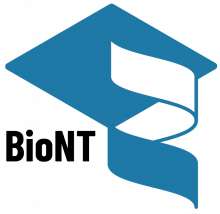Organisers
- Bérénice Batut (University of Freiburg)
- Teresa Müller (University Freiburg)
BioNT - BIO Network for Training - is an international consortium of academic entities and small and medium-sized enterprises (SMEs). BioNT is dedicated to providing a comprehensive training program and fostering a community for digital skills relevant to the biotechnology industry and biomedical sector. With a curriculum tailored for both beginners and advanced professionals, BioNT aims to equip individuals with the necessary expertise in handling, processing, and visualising biological data, as well as utilising computational biology tools. Leveraging the consortium's strong background in digital literacy training and extensive network of collaborations, BioNT is poised to professionalise life sciences data management, processing, and analysis skills.
This practical introduction to bioinformatics will explain key concepts of sequencing data analysis as well as a broader overview on bioinformatics data analysis.
Data analysis is a job in high demand. Already in 2012 a Harvard business review article declared data science the ‘sexiest job of the 21st century’ [1,2] and still in ‘2022 and beyond’ it is an excellent career choice [3]. Furthermore, studying the healthcare job market during Covid-19, we can clearly see a shift to analytical skills as a requirement in new job offers [4].
RNA-sequencing revolutionised genomics and health care research, by being a high-throughput and comparatively low-cost method. Together with the development of computational tools to enable their analysis, it has fundamentally improved our understanding of RNA biology [5].
Galaxy is a worldwide open source project with the European Galaxy server being the biggest instance in Europe with more than 70,000 users. The Freiburg Galaxy Team is hosting this server out of Freiburg. Through Galaxy as a gateway, we are offering free access to databases and more than 3,200 bioinformatics tools which can be used through a graphical user interface.
Within this workshop you will learn how to use Galaxy and how to perform a full RNA-seq data analysis. However, RNA-seq data is just one of many different kinds of data analyzed in bioinformatics. Therefore, the last workshop day will provide an overview of the wide range of bioinformatics databases and data formats.
Join this workshop if you are:
- Working in the field of Bioinformatics or biological data analysis or if you aspire to do so
- Interested in learning how to analyse transcriptomic data
- Interested in learning how to use Galaxy for data analysis
Learning Outcomes
By the end of this workshop, you will be able to:
- Interact with the data analysis platform Galaxy
- Get data from external sources into Galaxy
- Run tools on Galaxy and create a workflow
- Perform and interpret quality control of sequencing data
- Map reads on a reference genome and evaluate the mapping quality
- Explain the principle and specificity of mapping of RNA-seq data to an eukaryotic reference genome
- Select and run a state-of-the-art mapping tool for RNA-seq data
- Estimate the number of reads per gene
- Explain the count normalisation to perform before sample comparison
- Construct and run a differential gene expression analysis
- Analyse the DESeq2 output to identify, annotate, and visualise differentially expressed genes
- Understanding different bioinformatic data formats
- Overview over different bioinformatics data bases
Requirements
- No formal training in bioinformatics or genetics is needed. Only basic knowledge of genetics is required, like: What is DNA, RNA? or What is a gene?.
- Knowledge about sequencing techniques is a plus
- There is no need for programming or informatics skills
- PC/Laptop with a browser (we recommend e.g. Chrome or Firefox)
- Register a Galaxy EU account before the workshop
- European Galaxy Server (https://usegalaxy.eu)
- Verify the confirmation email!
- If you have any problem please contact: contact@usegalaxy.eu
How to register
The workshop is free of charge but subject to selection.
To apply, you will need to create an account on our platform. Please note that activation of this account can take up to 72 hours, after which you still need to register to the workshop.
To participate, please follow these steps:
- Click on the window “Participate” at the top of this page
- You will be redirected to the members.cecam.org page. If you already have an account on our platform, please proceed to step 5
- On the top-right corner click "Register" and complete the provided form. As indicated, completing this form does not register you to the workshop. Within 72 hours you will receive an email confirming your account has been activated. Due to this processing time, we advise you to register a few days before the registration deadline
- After receiving the account activation confirmation, visit the workshop page again and follow instructions starting from step 1
- You should now have an active account. After login in with your login details, you should be redirected to the workshop registration page.
- Follow the instructions of the linked pre-workshop survey and the indicated form. To submit your application, press "Send mail"
- Your application is now submitted for evaluation. If selected, you will be contacted later on to confirm your attendance and to provide you with instructions on how to attend the workshop online
Useful links and videos
